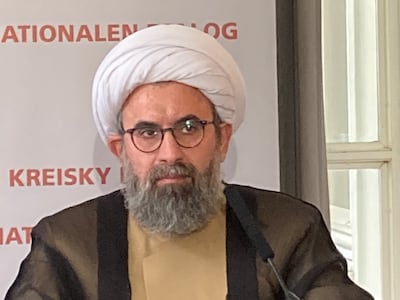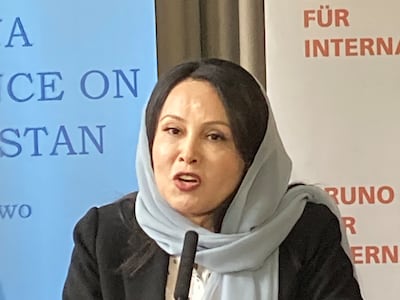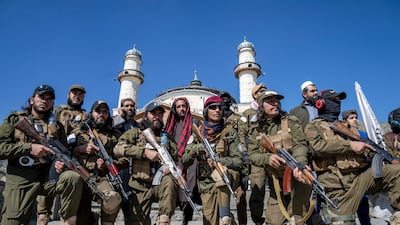The first sign of a united Afghan opposition to the Taliban has emerged in what could develop into a credible alternative government, following a three-day conference in Vienna.
Afghan resistance fighters, politicians and activists gathered in the Austrian capital and issued a declaration of a “new political vision for the country”.
Amid tight security, including armed police, the leader of the National Resistance Front was joined by other military commanders as well as women’s rights activists, Islamic scholars and ambassadors.
“The struggle is still young and needs time to gather strength,” said Aliye Yilmaz, an ethnic Uzbek and a women’s rights representative.
She was joined by Nigara Mirdad, deputy Afghan ambassador to Poland, who told The National: “We are sending a clear message to the Taliban and the world that we are working for the future of Afghanistan to bring the situation back to normal.
“This conference is a very clear message of our inclusiveness and ethnicities.”
Her words were endorsed by the Pashtuns, Hazaras, Uzbeks and Tajiks who assembled on Wednesday for the final day of the Vienna Conference on Afghanistan.
Their motivation was that, 20 months after the Taliban’s conquest of Kabul, Afghans are suffering increased deprivation and terror.
The only serious resistance is in the Panjshir Valley, where Tajik fighters have doggedly denied the mountainous province to the Taliban, as they did the Soviets.

Their commander is NRF leader Ahmad Massoud, son of the renowned Lion of Panjshir, Ahmad Shah Massoud.
“We are completely alone and abandoned by the region and the world,” he told the conference.
When the country was conquered, he said that he had given his people two choices: “The destruction of war or to give up everything and become a prisoner of the Taliban.
“The people chose to live with their principles rather than living under Taliban tyranny.”
Those principles were reflected in the joint proclamation made by the National Movement of Afghanistan on Wednesday “to establish a legitimate, elected political system inclusive of all the peoples of Afghanistan” representing “the unheard voices of the silent masses”.
Though Taliban rule in Afghanistan is absolute, the new movement is setting its sights providing a credible future alternative.

Nashkur Kabuli, an Islamic scholar originally from Kabul but now living in Germany, said the gathering aimed to “seek a way forward for Afghanistan”, to find a “viable road map that can provide a solution to the current crisis”.
“We are diverse voices and people from all different backgrounds,” he said. “This is for all of Afghanistan for freedom and nothing more than that.”
That freedom has been severely restricted for half the population, with women's rights advances achieved during the 20 years following the US-led invasion having almost completely vanished.
“The Taliban don’t recognise the role of women or of women as human beings,” said Ms Yilmaz. “For us to continue our actions, we will need women’s resistance.
“Unfortunately, the women’s struggle does not receive enough support and assistance from the international community.”

But the Taliban should be concerned that the opposition are able to unify such a diverse grouping of Afghans.
“We have different voices here — women, military resistance, journalists and activists — but we are all united for Afghanistan’s freedom,” said Ms Mirdad.
“For us all to come together in one forum, this is an achievement of this conference because we have lost everything — freedom, rights and the violation of women who have no rights at all.”
The movement’s leaders expressed regret that the international community is not listening to their pleas for support, but they are determined to fight on.
“Our situation has been forgotten to some extent,” said Mr Massoud. “It’s up to the opposition to unite and find a solution. This is an initiative to bring unity and to make the Taliban come to the negotiating table.”
If the Taliban were to agree to elections, the NRF would immediately end its resistance, he said.
“The doors for negotiation are never closed but the Taliban don’t care, so we have no choice but to defend ourselves.”
Dressed in an olive green jacket, Ashraf Ali, a military commander in the NRF, described the “bleak situation” in Afghanistan, with the oppression of its people along with millions of refugees in Iran and Pakistan.
“I am here as part of the NRF and I can tell you the citation in Afghanistan is dire,” he said. “It is vital to find the right solution for our country.”


